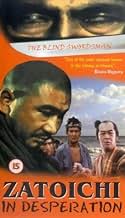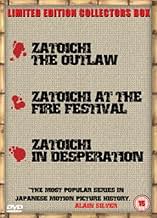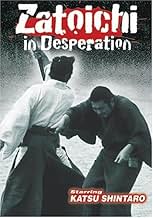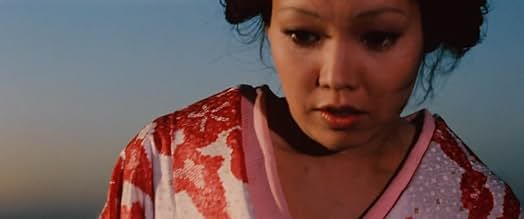VALUTAZIONE IMDb
6,8/10
1242
LA TUA VALUTAZIONE
Aggiungi una trama nella tua linguaAfter accidentally causing an old lady's death, Zatoichi seeks out her daughter to atone for the tragedy, consequently getting into all sorts of trouble.After accidentally causing an old lady's death, Zatoichi seeks out her daughter to atone for the tragedy, consequently getting into all sorts of trouble.After accidentally causing an old lady's death, Zatoichi seeks out her daughter to atone for the tragedy, consequently getting into all sorts of trouble.
- Regia
- Sceneggiatura
- Star
Recensioni in evidenza
This is the best one, number 24. Ichi realizes that he is not a hero, is making everyone's lives ultimately more violent and difficult than it would have without his existence. He is physically punished for this and still dispatches 20 dudes without using his hands.
If you don't like mean people, you know, actually effective villains, this one might make your little sensitivities buzz. The moral philosophy Katsu evaluates is artful and considerate. This is a brutal, dark, and ballsy entry.
If you don't like mean people, you know, actually effective villains, this one might make your little sensitivities buzz. The moral philosophy Katsu evaluates is artful and considerate. This is a brutal, dark, and ballsy entry.
The following review is an extract from the book "Shintaro Katsu´s Zatoichi: Complete guide to all movies", which is now available on Amazon.
Zatoichi crosses a bridge with a woman who plays the shamisen. The old woman warns him to be careful, for the wood of the bridge has holes, and it is easy to fall if one does not pay attention. The two talk briefly, and the lady asks the blind man where he is going. "Nowhere in particular, wherever the wind takes me", replies the wandering masseur. The old woman replies that she intends to visit her daughter, who works in a geisha house called Ogiya in a nearby town. Moments after they have said goodbye, the blind man has the idea of offering some coins to the old woman, as a tip for playing the shamisen so well... The grateful woman is about to take the coins, but distracted by the surprising gift, slips, loses her balance and falls into the void... She, who had recommended to the blind man to be very careful.
Zatoichi feels guilty for the deadly accident of the poor woman. Unlike its owner, the instrument has remained on the bridge and the masseur picks it up. With the shamisen he walks towards the city of which the deceased spoke to him, to look for his daughter, the geisha, in Ogiya.
(...)
This, the 24th and penultimate, is one of the two films in the saga directed by actor Shintaro Katsu himself, who also acted as co-producer. The other, also directed by Katsu, is the last of the originals (called "Zatoichi" just like that), which was filmed many years later - in 1989 - and where you can see an already grayed and almost old Ichi.
"Zatoichi in desperation", as its title already indicates, is fraught with deep pessimism. Oppressive and dark, sad, depressing and hopeless. Tragically and emotionally brutal.
It also has an undeniable poetic undertone.
Zatoichi crosses a bridge with a woman who plays the shamisen. The old woman warns him to be careful, for the wood of the bridge has holes, and it is easy to fall if one does not pay attention. The two talk briefly, and the lady asks the blind man where he is going. "Nowhere in particular, wherever the wind takes me", replies the wandering masseur. The old woman replies that she intends to visit her daughter, who works in a geisha house called Ogiya in a nearby town. Moments after they have said goodbye, the blind man has the idea of offering some coins to the old woman, as a tip for playing the shamisen so well... The grateful woman is about to take the coins, but distracted by the surprising gift, slips, loses her balance and falls into the void... She, who had recommended to the blind man to be very careful.
Zatoichi feels guilty for the deadly accident of the poor woman. Unlike its owner, the instrument has remained on the bridge and the masseur picks it up. With the shamisen he walks towards the city of which the deceased spoke to him, to look for his daughter, the geisha, in Ogiya.
(...)
This, the 24th and penultimate, is one of the two films in the saga directed by actor Shintaro Katsu himself, who also acted as co-producer. The other, also directed by Katsu, is the last of the originals (called "Zatoichi" just like that), which was filmed many years later - in 1989 - and where you can see an already grayed and almost old Ichi.
"Zatoichi in desperation", as its title already indicates, is fraught with deep pessimism. Oppressive and dark, sad, depressing and hopeless. Tragically and emotionally brutal.
It also has an undeniable poetic undertone.
I've seen 23 of the 26 films in the series (not including the Kitano) and this is by far the hardest to watch. It is less about Zatoichi and more about the cruelty and hardship of living in poverty in a fishing village in Edo era Japan. The film dwells very much upon the secondary characters as ends unto themselves and not just as elements in a story setting up a problem which Zatoichi will eventually resolve. Zatoichi acts as you would expect him to but he is overwhelmed by the misery and circumstances in a way that is unique in the series. Watch it by all means, but not with a light heart. I found myself also overwhelmed by the misery depicted in the film. It is unsettling.
I have not seen more than five of the classic (and undeniably classy) Zatoichi samurai films, but this is surely the best, cinematographically, so far. It;s hard to believe this was shot in Eastman Color, a kind of poor second to Technicolor (and with far less durability; either the negative was especially preserved, or digital restoration was performed by a true expert; but in any event, this film is absolutely gorgeous to look at.
The story is dark, as others have noted; but the Zatoichi series, like most of the sword-fight genre series films to come out of Japan, is pretty heavy-handed stuff; the Japanese seem to take this sort of thing very seriously. Yet there is no doubt Zatoichi "24" stands out as exceptional, from both the series and its genre. The reason, I think, is its almost total sense of social dislocation; Zatoichi is treated by the other characters as somehow less than human, and his determination to fight at the end somewhat more than human, and so he comes across as something other than human; but the other humans of the film come across as rather poor representatives of the species. I should note that there is very little dialog in this film, particularly at the most dramatic moments, which heightens our sense that we are watching some tragedy from another reality.
The question here is, has director/star Katsu pushed his character to such an extreme that he is no longer representative of his genre, but somehow an independent dramatic entity, a "grade-A film", as might be enjoyed by those who disdain genre-films? well, I suggest this film to such viewers, as the "one chambara (Japanese sword-fight)film to see". But in any event, it is an exceptional, and troubling, cinema experience for anyone.
The story is dark, as others have noted; but the Zatoichi series, like most of the sword-fight genre series films to come out of Japan, is pretty heavy-handed stuff; the Japanese seem to take this sort of thing very seriously. Yet there is no doubt Zatoichi "24" stands out as exceptional, from both the series and its genre. The reason, I think, is its almost total sense of social dislocation; Zatoichi is treated by the other characters as somehow less than human, and his determination to fight at the end somewhat more than human, and so he comes across as something other than human; but the other humans of the film come across as rather poor representatives of the species. I should note that there is very little dialog in this film, particularly at the most dramatic moments, which heightens our sense that we are watching some tragedy from another reality.
The question here is, has director/star Katsu pushed his character to such an extreme that he is no longer representative of his genre, but somehow an independent dramatic entity, a "grade-A film", as might be enjoyed by those who disdain genre-films? well, I suggest this film to such viewers, as the "one chambara (Japanese sword-fight)film to see". But in any event, it is an exceptional, and troubling, cinema experience for anyone.
It started up well, yet, at a certain point the script turned to a level of imbecility comparable with a big studio US creation. Well, compared with the level of the US Academy this can easily can take an Oscar for best script.
On the other hand this movie achieves something almost unique. The visual style is so unusual (especially for somebody used with the standard blockbuster) that both makes the film unforgettable and hard to watch. In my opinion this is what Mean Streets and The Killing of a Chinese Bookie should have looked like if the tech team involved would have been skilled enough. The gambling scene alone makes Rounders look like a half baked high-school project (which is not far from the truth anyway).
A 6 for cramming so much into this movie. You have a social message, the indolence of the rich (the young watching the fishermen's boats burn), the unromaticised noblemen, etc.
Contact me with Questions, Comments or Suggestions ryitfork @ bitmail.ch
On the other hand this movie achieves something almost unique. The visual style is so unusual (especially for somebody used with the standard blockbuster) that both makes the film unforgettable and hard to watch. In my opinion this is what Mean Streets and The Killing of a Chinese Bookie should have looked like if the tech team involved would have been skilled enough. The gambling scene alone makes Rounders look like a half baked high-school project (which is not far from the truth anyway).
A 6 for cramming so much into this movie. You have a social message, the indolence of the rich (the young watching the fishermen's boats burn), the unromaticised noblemen, etc.
Contact me with Questions, Comments or Suggestions ryitfork @ bitmail.ch
Lo sapevi?
- QuizOnly film in the original series directed by Zatoichi himself, Shintarô Katsu. He would go on to direct one more, Zatôichi (1989).
- Citazioni
Boss Mangoro Kagiya: Please enjoy watching as Zatoichi meets his end.
- ConnessioniFollowed by Mang jian xue di zi (1973)
I più visti
Accedi per valutare e creare un elenco di titoli salvati per ottenere consigli personalizzati
- How long is Zatoichi in Desperation?Powered by Alexa
Dettagli
- Data di uscita
- Paese di origine
- Lingua
- Celebre anche come
- Zatoichi in Desperation
- Aziende produttrici
- Vedi altri crediti dell’azienda su IMDbPro
- Tempo di esecuzione
- 1h 35min(95 min)
- Mix di suoni
- Proporzioni
- 2.35 : 1
Contribuisci a questa pagina
Suggerisci una modifica o aggiungi i contenuti mancanti






























